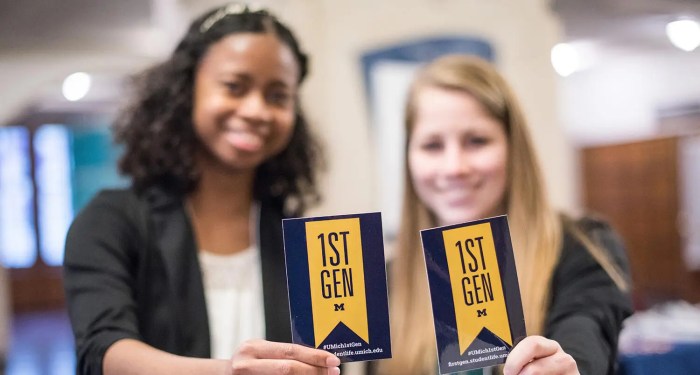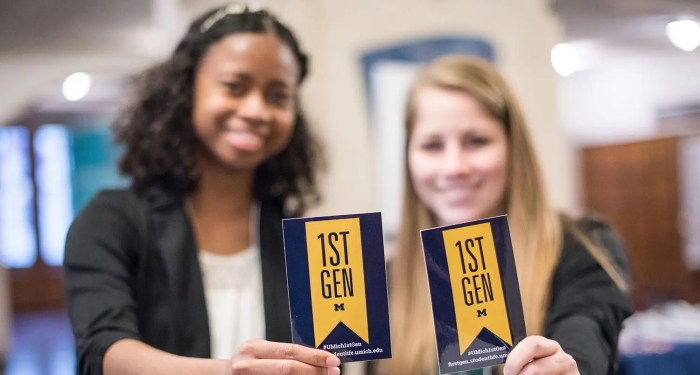Scholarships for first generation students – Scholarships for first-generation students represent a vital pathway to higher education, overcoming significant financial and systemic hurdles. These scholarships not only provide crucial financial assistance but also offer invaluable support and mentorship, empowering students to thrive academically and professionally. This exploration delves into the various types of scholarships available, strategies for securing them, and the broader impact on student success.
Navigating the complexities of college applications and financial aid can be particularly challenging for first-generation students who may lack familial guidance in this area. Understanding the unique challenges faced by this population—from cultural and linguistic barriers to a lack of familiarity with the higher education system—is crucial to effectively supporting their aspirations. This guide aims to provide a comprehensive resource to help first-generation students successfully secure the funding they need to pursue their educational goals.
Defining “First-Generation Student”
The term “first-generation college student” broadly refers to students who are the first in their immediate family to pursue a post-secondary education. This definition, however, can vary slightly across institutions and scholarship programs. Some may include students whose parents did not complete a four-year degree, while others may focus solely on those with parents who lack any college experience. Understanding these nuances is crucial for accurately identifying and supporting first-generation students.
The unique challenges faced by first-generation students are multifaceted and often intersect. Navigating the complexities of the higher education system, from financial aid applications to course selection and career planning, can be particularly daunting without the benefit of familial guidance and experience. The lack of a support network familiar with the college environment can lead to feelings of isolation and uncertainty, impacting academic performance and overall well-being. Moreover, the pressure to succeed financially and academically, often to support their families, can add significant stress.
Socioeconomic Backgrounds and First-Generation Student Experiences
The experiences of first-generation students are significantly shaped by their socioeconomic backgrounds. Students from low-income families may face additional financial constraints, limiting their access to resources like tutoring, technology, and even adequate nutrition, all of which can affect academic success. Conversely, first-generation students from higher-income families may encounter different challenges, such as navigating expectations and social pressures within a potentially unfamiliar college environment. While both groups share the common experience of being the first in their families to attend college, the specific hurdles they overcome differ greatly based on their financial circumstances. For example, a student from a low-income family might struggle to afford textbooks, while a student from a higher-income family might grapple with feelings of imposter syndrome or a lack of familiarity with college social dynamics.
Cultural and Linguistic Barriers
Cultural and linguistic barriers can significantly impact the academic success of first-generation students. Students from non-English speaking backgrounds may face challenges in understanding course materials, participating in class discussions, and navigating the broader college environment. Similarly, cultural differences in communication styles and learning preferences can create additional hurdles. For instance, a student from a culture that emphasizes deference to authority might find it difficult to actively participate in class discussions, even if they have a strong understanding of the material. Furthermore, cultural norms around seeking help and academic support might differ, leading to some students feeling hesitant to reach out for assistance when needed. Institutions can effectively address these challenges through culturally sensitive support services and inclusive learning environments.
Types of Scholarships Available

Securing funding for higher education is a significant hurdle for many students, particularly first-generation college students who may lack the familial guidance and financial resources readily available to their peers. Fortunately, a variety of scholarships are specifically designed to support and empower these students to pursue their academic dreams. These opportunities recognize the unique challenges and triumphs of first-generation students and provide vital financial assistance.
Numerous scholarships cater specifically to first-generation students, offering financial aid based on merit, need, or a combination of both. These scholarships are offered at various levels – national, regional, and institutional – broadening access for students across the country. Understanding the different types and sources of these scholarships is crucial for successful applications.
Categorization of Scholarships for First-Generation Students
First-generation scholarships can be categorized in several ways, primarily by funding source and award criteria. Many scholarships are need-based, assessing the student’s financial circumstances to determine eligibility. Others are merit-based, rewarding academic achievement, leadership skills, or community involvement. Some scholarships combine both need and merit considerations. Furthermore, some scholarships are field-specific, supporting students pursuing particular majors or career paths.
Examples of National, Regional, and Institutional Scholarships
Several organizations offer national scholarships for first-generation students. For instance, the Ronald E. McNair Post-Baccalaureate Achievement Program provides opportunities for first-generation, low-income, and underrepresented students to pursue doctoral studies. Regional scholarships might be offered by state-based organizations or community foundations, often focusing on students within a specific geographic area. Examples include scholarships offered by state higher education commissions or local community foundations. Institutional scholarships are offered directly by colleges and universities. Many universities have dedicated scholarship programs for first-generation students, often funded through endowments or alumni donations. These are often advertised directly on the university’s financial aid website.
Types of First-Generation Scholarships
| Scholarship Type | Description | Example (Illustrative – Actual programs vary widely) | Funding Source |
|---|---|---|---|
| Need-Based | Awards are based on demonstrated financial need, as determined by the FAFSA or CSS Profile. | University-sponsored First-Generation Need-Based Grant | University Endowment, Alumni Donations |
| Merit-Based | Awards are based on academic achievement, extracurricular activities, or leadership qualities. | National First-Generation Achievement Scholarship | Private Foundation, Corporate Sponsor |
| Field-Specific | Awards are targeted towards students pursuing specific academic fields or career paths. | STEM Scholarship for First-Generation Students | Professional Organization, Industry Partner |
| Combined Need and Merit | Awards consider both financial need and academic merit in the selection process. | Regional First-Generation Leadership Award | Community Foundation, Local Business |
Flowchart of a Typical First-Generation Scholarship Application Process
A flowchart visually representing the application process would show a series of boxes and arrows. Starting with “Identify Potential Scholarships,” the flow would continue to “Research Eligibility Requirements,” then “Gather Necessary Documents” (transcripts, essays, letters of recommendation, etc.), followed by “Complete the Application,” “Submit the Application,” and finally “Await Notification of Award.” A “No” decision would loop back to “Research Eligibility Requirements” or “Gather Necessary Documents” depending on the reason for rejection. A “Yes” decision leads to the final box. The flowchart visually depicts the iterative and sometimes repetitive nature of the scholarship application process.
Support Systems and Resources for First-Generation Students

Navigating the complexities of higher education can be challenging for any student, but it can be particularly daunting for first-generation college students who may lack the familial experience and support network common among their peers. Fortunately, many colleges and universities recognize this and offer a range of robust support services specifically designed to help first-generation students thrive. These services aim to address the unique academic, social, and emotional needs of this population, fostering a sense of belonging and increasing their chances of success.
On-Campus Support Services for First-Generation Students
Colleges and universities often provide dedicated programs and services catering to first-generation students. These might include specialized advising, tutoring, and mentoring programs. Many institutions offer workshops focused on topics like financial aid navigation, career planning, and time management—skills that can be particularly beneficial for students without prior exposure to the higher education system. Some universities even have designated centers or offices dedicated solely to supporting first-generation students, providing a central hub for resources and community building. For example, many universities have “First-Gen” student organizations that provide networking opportunities, mentorship programs, and social events. These centers often host workshops on topics such as navigating financial aid, understanding college policies, and developing effective study habits.
The Role of Mentors and Advisors in Guiding First-Generation Students, Scholarships for first generation students
Mentors and academic advisors play a crucial role in the success of first-generation students. Mentors, often faculty members or older students, offer guidance and support beyond the classroom, acting as role models and providing valuable insights into navigating college life. They can help students develop academic strategies, explore career options, and build confidence. Academic advisors provide essential guidance on course selection, degree requirements, and other academic matters. Their expertise in navigating university systems can be invaluable to first-generation students who may lack familiarity with these processes. A strong mentor-mentee relationship can significantly impact a student’s academic trajectory and overall college experience. For instance, a mentor might help a student connect with relevant research opportunities or internships, leading to enhanced career prospects.
Benefits of Peer Support Networks and Student Organizations
Peer support networks and student organizations provide invaluable social and academic support for first-generation students. Connecting with other students who share similar backgrounds and experiences can foster a sense of belonging and reduce feelings of isolation. These networks provide a safe space to share challenges, celebrate successes, and learn from one another’s experiences. Student organizations specifically for first-generation students often organize events and activities that promote community building and provide opportunities for networking and leadership development. Furthermore, participation in such groups can help students develop valuable interpersonal skills and build their professional networks. The shared experience of navigating the complexities of college life as a first-generation student creates strong bonds and a supportive community.
Interconnectedness of Support Systems
Imagine a network diagram. At the center is the first-generation student. Radiating outwards are interconnected circles representing the different support systems. One circle represents on-campus support services (advising, tutoring, workshops). Another circle depicts mentors and advisors, providing individualized guidance and support. A third circle shows peer support networks and student organizations, fostering a sense of community and belonging. These circles overlap significantly, indicating the interconnected and synergistic nature of these resources. The student benefits most when they actively engage with all available support systems, creating a comprehensive network of assistance that enhances their overall college experience and increases their chances of success.
Securing a scholarship can be transformative for first-generation college students, opening doors to opportunities that might otherwise remain inaccessible. By understanding the available resources, developing strong applications, and leveraging support systems, these students can overcome financial barriers and achieve their academic and career ambitions. Investing in scholarships for first-generation students is not merely a financial investment; it is an investment in the future, fostering a more diverse, equitable, and prosperous society.
Questions and Answers: Scholarships For First Generation Students
What constitutes a first-generation college student?
Generally, a first-generation college student is defined as a student whose parents did not complete a four-year college degree. Definitions can vary slightly among institutions.
Are there scholarships specifically for students from low-income families?
Yes, many scholarships consider both first-generation status and financial need. Look for scholarships that emphasize need-based aid in addition to first-generation criteria.
How can I improve my chances of getting a scholarship?
Craft a compelling personal essay highlighting your unique experiences and aspirations. Thoroughly research available scholarships and tailor your applications to each one. Seek mentorship and guidance from advisors or mentors.
What if I don’t qualify for many scholarships?
Explore other financial aid options, such as grants and loans. Contact your college’s financial aid office for assistance in navigating the financial aid process and identifying additional resources.
Securing funding for higher education is crucial, especially for first-generation students navigating the complexities of the college application process. Many scholarships exist specifically to support these students, and the opportunities extend beyond undergraduate studies. For those aiming for advanced degrees, consider exploring the numerous options available, such as those listed on this helpful resource for phd scholarships , which can significantly aid in pursuing doctoral research.
Ultimately, a wide range of financial aid is available to help first-generation students achieve their academic goals.
